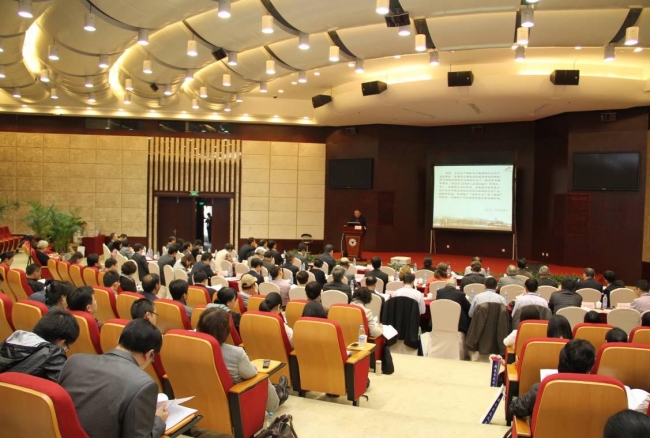| The 2nd International Conference on Cultural Heritage and 2013 Annual Meeting of Union for Conservation of Historic Urban Landscape Ended Successfully in Hangzhou |
| PublishDate:2013-11-11 Hits:3410 |
The 2nd Hangzhou International Conference on World Cultural Heritage was held from 5-7 November 2013. The conference was hosted by Union for Conservation of Historic Urban Landscape, Hangzhou Urbanology Research Council, Zhejiang University and the Korea Foundation for Advanced Studies, and co-hosted by Hangzhou International City Study Research Center (World Heritage Conservation Hangzhou Research Centre), Secretariat of Union for Conservation of Historic Urban Landscape, World Heritage Institute of Training and Research for the Asia and the Pacific Region, Hangzhou West Lake Scenic Spots and Places of Interest Administration Committee (Hangzhou Gardening and Cultural Relics Administration Bureau), and the Cultural Heritage Institute, Asia Research Centre, Institute of Cross-Cultural Studies and Institute of Anthropology of Zhejiang University. More than 150 scholars and experts, as well as managers of cultural heritage institutes from the Great Britain, France, Italy, Australia and China, attended the meeting to discuss from a global perspective on the innovation of heritage concept and the application and promotion of the new approach of Historic Urban Landscape in cultural heritage conservation and world heritage nomination.
The launching ceremony for the Development Report on China Historic Urban Landscape Conservation (2013) was held and the Hangzhou Consensus by the Union for Conservation of Historic Urban Landscape was released during the conference. It is pointed out a rapid urbanization has caused enormous economic, cultural and social pressures on cultural heritage conservation. The development mode of large-scale “demolishing and reconstructing” has led to a loss of city character and homogeneous trends in both city and culture, affecting city`s sustainable development in the long run. By taking into account of a series of inherent elements in both natural and cultural context including existing built environment, intangible heritage, cultural diversity, social, economic and environmental elements as well as local values, the Historic Urban Landscape (HUL) approach aims to establish a set of guidelines, to make sure that historical and cultural value, traditions and their necessary environment are respected in the development of a city, and to make the development mode beneficial by seeking a perfect balance between conservation and development.
|
- Documentary: 2023 World Heritage Creative X Innovators Conference and the AWHEIC Third Anniversary Celebration
- Publication | WHITRAP Newsletter No. 61
- Mt. Huangshan first show in Climate Action for World Heritage
- Call for Good Practices: 2024 Environment and Resilience
- FAQs | 2024 Call for Good Practices
- Operational Guidelines for the Implementation of the World Heritage Convention 2017
Copyright © 2009-2012 World Heritage Institute of Training and Research-Asia and Pacific (shanghai)



